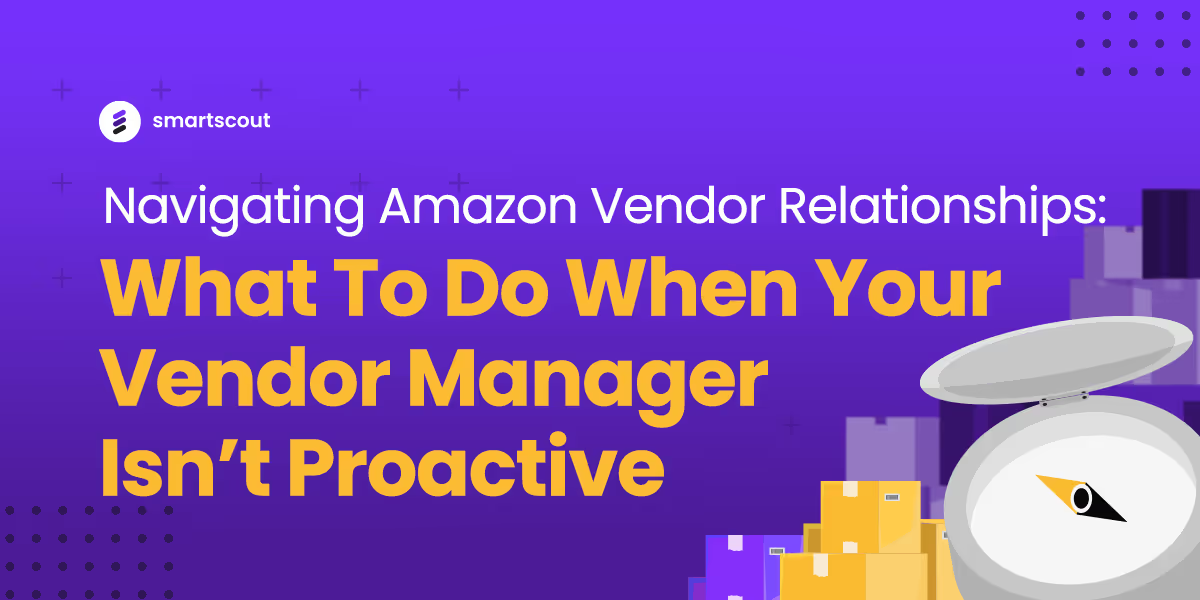As an Amazon vendor, you might have experienced a less-than-stellar relationship with your Vendor Manager.
The Vendor Manager’s goals may not align with yours and may even consider your brand as a “set it and forget it.” These issues can hinder your business's success on the platform. It could simply be about poor communication or a general lack of proactivity.
There is a lot of churn between Vendor Managers and the brands they manage. You may have a great connection and then all of a sudden you’re left with someone that is dropping the ball.
What can you do if your Amazon Vendor Manager isn't proactive? Let us provide you actionable steps to ensure your business thrives on Amazon.
Communicate Clearly and Assertively
Sometimes, a lack of proactivity from your Vendor Manager can be attributed to miscommunication or unclear expectations. Ensure you clearly communicate your needs, expectations, and goals. Keep the lines of communication open, and don't hesitate to follow up if you haven't received a response in a reasonable time frame.
Be Proactive in Finding Solutions
If your Vendor Manager isn't taking the initiative, it's time for you to step up. Research the issues you're facing and propose possible solutions. You can encourage your Vendor Manager to proactively address your concerns by demonstrating your willingness to problem-solve.
Build Relationships with Other Amazon Teams
Don't rely solely on your Vendor Manager. Connect with other Amazon teams, such as the Strategic Account Services or Advertising team, to resolve any problems or gather information. Building relationships with multiple Amazon contacts can help you navigate the platform more effectively and provide additional support when needed.
Utilize Amazon's Resources
Amazon offers a variety of resources for vendors, including online training materials, webinars, and forums. Take advantage of these resources to gain a deeper understanding of the platform and improve your business practices. The more knowledgeable you are, the better equipped you'll be to handle any issues that arise.
Seek External Assistance
If you're still struggling to get the support you need from your Vendor Manager, consider hiring an Amazon consultant or partnering with an agency that specializes in Amazon vendor management. These experts can provide guidance, address your concerns, and help you optimize your business on the platform.
Move Some of Your Catalog to Seller Central
Making the transition from Amazon Vendor Central to Seller Central can be a strategic move for businesses seeking more control over their product listings, pricing, and inventory management. This shift enables vendors to operate as third-party sellers, allowing them to engage with customers and better optimize their operations directly.
Although this change may require time and resources to learn the new platform, businesses can benefit from increased flexibility, access to valuable sales data, and the ability to manage their brand presence more effectively.
Escalate the Issue
If you've exhausted all other options and still aren't receiving the support you need, it's time to escalate the issue. Contact your Vendor Manager's supervisor or contact Amazon's leadership team.
Be professional and concise in your communication, outlining the problems you've encountered and the steps you've taken to resolve them.
Conclusion
A proactive Amazon Vendor Manager is essential to the success of your business on the platform. If you find yourself with a less-than-ideal Vendor Manager, take the necessary steps to improve communication, build relationships, and seek external support. By doing so, you can ensure your business thrives on Amazon and continues to grow.










